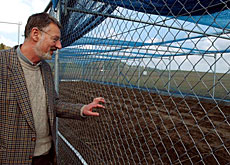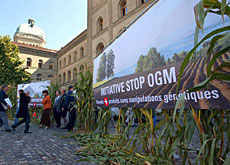Government opposes GM crop moratorium

The government has come out against a proposal calling for a five-year moratorium on genetically modified (GM) crops in Switzerland.
It said such a move would damage Switzerland’s standing in the field of agricultural research as well as its trade relations with other countries.
Put forward by a coalition of environmental groups, consumers and farmers, the people’s initiative calls for a ban on the farming of GM crops for use in food, and the importing of GM seeds and fodder.
Supporters collected almost 121,000 signatures – 100,000 are needed for a people’s initiative – in just seven months last year, after parliament voted to reject a moratorium on GM crops.
But on Wednesday, the cabinet said that a law on genetics that came into effect in January this year adequately protected humans, animals and the environment against abuses.
It said that the law had already set out a procedure authorising the import and distribution of Genetically Modified Organisms or GMOs. It added that the legislation was precautionary and aimed at protecting non-GM agriculture.
Added to this, said the government, was the fact that the procedure for allowing genetically modified plants in the country was likely to take several years.
Damage
Ministers also said that the initiative went too far and could damage Switzerland as a place of scientific development, even if research was not directly targeted by the moratorium.
In a statement, they said that scientists could be tempted to conduct their work elsewhere if the future of GM crops remained uncertain in Switzerland.
Another point for the government was that if the country accepted a moratorium on imports, this could have a damaging effect on its trade relations and Switzerland could stand accused of violating international treaties.
Supporters of the initiative are concerned that GM crops could contaminate non-GM crops in neighbouring fields.
They deny the moratorium would have an impact on research.
The proposed freeze does not include the scientific sector and it would allow continued test crops in open fields, provided there were time and space limitations.
Trials
The first trial of GM crops was approved in February. Until then the country had been free of genetically modified crops.
The country’s two largest retailers, Coop and Migros, still refuse to sell or stock GM products. Polls have shown a high resistance among the public to GM products.
Parliament is due to pronounce on the initiative this winter at the earliest and if it gets the go ahead, a vote on GM crops could take place by mid-January 2007.
swissinfo with agencies
18.9.2003: About 20 environmental, farming and consumer groups formally hand in an initiative calling for a moratorium on GM crops.
27.2.2004: The first trial of GM crops by the Federal Institute of Technology in Zurich is approved by the government.
18.8.2004: The government comes out against the initiative.
Since 1996, the number of areas under cultivation with GM crops has multiplied by 40. Last year they covered 68 million hectares in 18 countries.
GMOs are found in 55% of the world production of soja, 21% of cotton. 16% of oil seed rape and 11% of maize.
The European Union has just allowed sales of a variety of GM maize.

In compliance with the JTI standards
More: SWI swissinfo.ch certified by the Journalism Trust Initiative



You can find an overview of ongoing debates with our journalists here. Please join us!
If you want to start a conversation about a topic raised in this article or want to report factual errors, email us at english@swissinfo.ch.